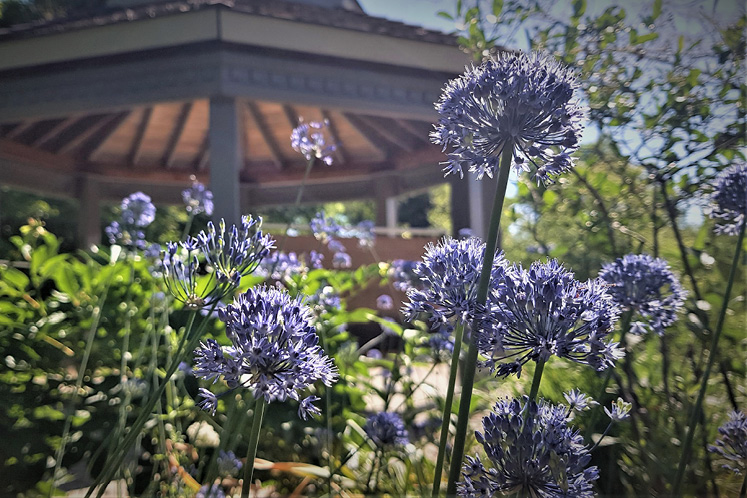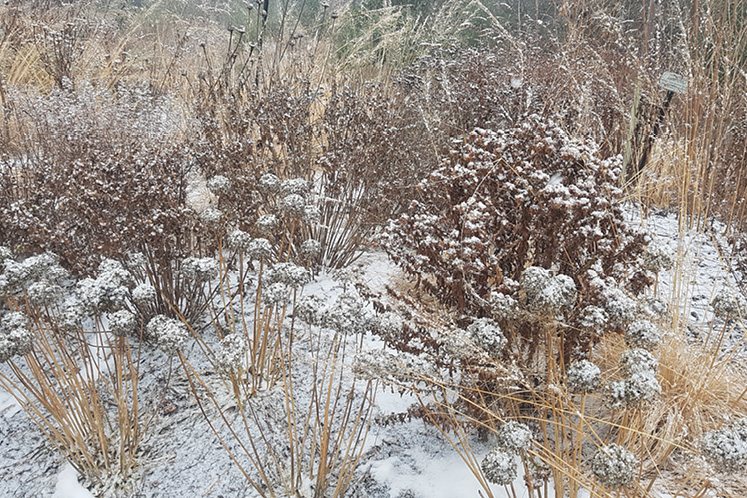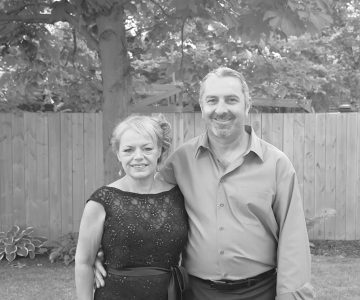To Every Thing There Is A Season
Inspired by the natural rhythms of life, a host of gardeners has created a refuge of calm and beauty for the dying and the grieving – and those who care for them – at Bethell Hospice.
Allister Taylor knows loss. Over a brief span he dealt with the deaths of a younger brother, older sister, a cousin and his beloved wife, Rita. Coping with a deep well of grief, he turned to the bereavement services at Bethell Hospice in Inglewood for support. There he discovered the gardens that became his destination of tranquil refuge.
Allister visits the Bethell Hospice gardens throughout the year where he relaxes on a bench amid floral beauty and birdsong. He finds the gardens loveliest in the spring when the daffodils bloom and quotes Wordsworth: “A host of golden daffodils / Beside the lake, beneath the trees / Fluttering and dancing in the breeze.”
Allister has great affection for the hospice gardens and, in fact, with the whole palliative care concept the Bethell Hospice so aptly embodies. He donates to the hospice and has purchased two trees for the gardens, one in memory of his late wife, the other simply to support the gardens’ environmental vision.
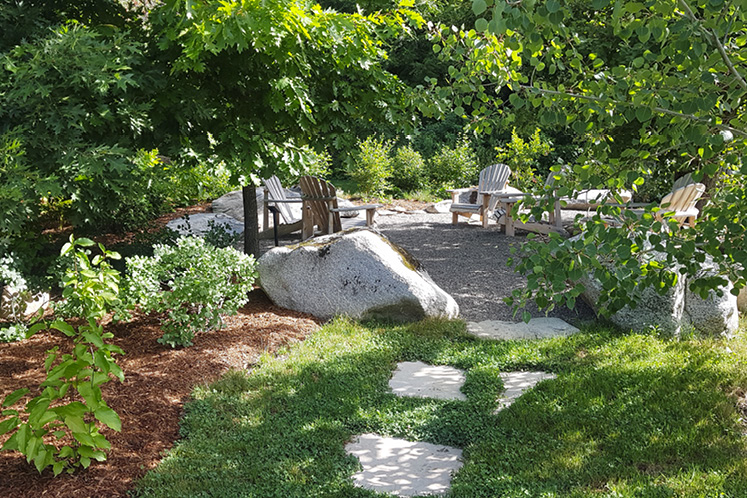
Year-round, the Secret Garden provides a quiet respite for staff and volunteers. Photography by Susanne McRoberts.
The hospice gardens first glinted in the imaginations of a committee of staff members and volunteers back in 2010. Today a team of dedicated volunteers continues to work the soil at the gardens. Two of the principal volunteers are firmly planted in the horticultural world. Sheilagh Crandall, along with her sisters and daughter, Sarah, operates Mount Wolfe Farm in Caledon, while Susanne McRoberts nurtures magic in her Belfountain garden, featured in the spring 2022 issue of this magazine.
That original committee balked at an initial plan to landscape the space in a formal style populated by the exotic perennials that typify most Ontario gardens. Instead, they favoured a more naturalistic style leaning to native plant species that would support birds, bees and butterflies. To this end the first iteration of the gardens was established.
Gardening, however, is a capricious pursuit. Longtime CBC gardening guru Ed Lawrence, now retired, captured the yin and yang of gardening perfectly with the title of his bestselling book, Gardening: Grief and Glory.
By 2018, Sheilagh, Susanne and the landscaping team were experiencing a considerable dose of gardening grief. Pernicious invasives were taking over – thistle, black medic, bird’s foot trefoil – pushing out the desired plants. So they asked Peter Fuller, a native plant expert and, at the time, owner of Fuller Native and Rare Plants in Belleville, to weigh in. His advice was jaw-dropping: Start over!
It took a while for Susanne and the others to digest this stark directive, but they reluctantly agreed it had merit. To realize the initial vision of sustainable, naturalistic gardens, they would need to start from scratch. Well almost. Desirable perennials would be set aside and replanted. Everything else went to the compost pile.
A daunting task
But now faced with an intimidating expanse of bare, compacted soil laced with an amalgam of stones and construction debris, the daunting task of a garden rebuild loomed. And if it takes a village to raise a child, it takes a landscape committee, a dedicated cadre of volunteers, a supportive administration and generous donations to make spectacular four-season gardens. Importantly, all levels of the Bethell Hospice community, including then board chair Lynn Dobson, vice-chair John Palmer, and previous interim executive director Debbie Davis, contributed time and effort to the project. Elizabeth Birnie, daughter of Lorna Bethell, the founding visionary of the hospice, also played a key role.
Lots of compost and good earth were called for. Enter Paul de Wet whose mother passed away at Bethell Hospice in 2016. Paul and Above and Beyond Landscaping, where he is director, donated soil, plants and, critically, labour. Paul’s generous support for the hospice gardens is a very visible example of volunteers giving back to the hospice where loved ones have spent their final days.
Anita Schenk is another volunteer linked by grief and gratitude to Bethell Hospice. Her husband passed away at Bethell in his 50s, and Anita has since become a vital hospice fundraiser and champion of the gardens. She understands plants, having grown up in a family that operated a nursery in Belfountain. As one of her fundraising initiatives, she recently organized a curling bonspiel, with half the proceeds going to the hospice.
Anita tells a poignant story that captures one of the reasons she’s such a passionate garden booster. “While I was weeding one summer, I noticed a very upset little girl pacing the garden with a gentleman who was likely her dad. The pair would stop occasionally, and the father would point out a flower in the garden. Eventually their pacing became slower and more mindful. I was reminded of the peace and tranquility I experienced during beautiful mornings in my husband Dave’s room, looking out the expansive picture windows.”
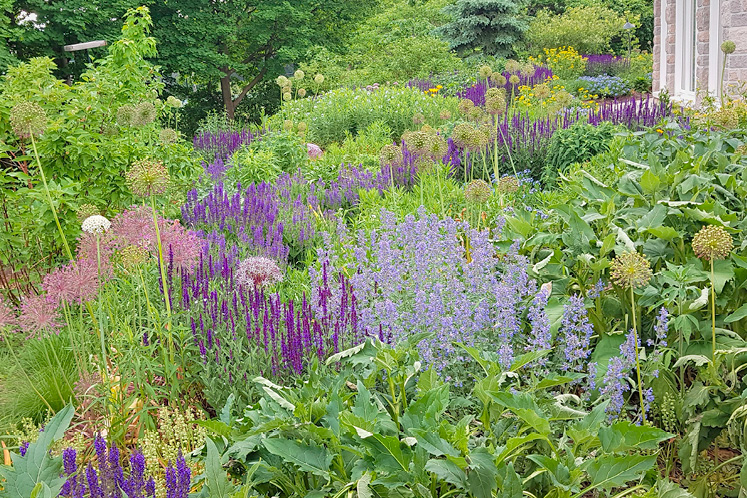
Residents’ rooms at Bethell Hospice open out to expansive gardens that surround three sides of the building.
Anita is joined by many other people who value the gardens and keep them thriving. There is Gerry Crake, the hospice’s maintenance co-ordinator – a no-nonsense jack-of-all-trades with an uncanny resemblance to Woody Harrelson. “He plants trees, shrubs, cuts back the perennial stems in early spring and manages irrigation during drought,” says Susanne. “He built our distinctive pergola where visitors and volunteers find shade. He’s the guy that makes everything work. He really cares.”
And then there is the indefatigable Neil Morris, a weekly volunteer at Bethell Hospice since its inception. To Susanne and Sheilagh, Neil is indispensable. Neil does a lot of the grunt work. “I’m stubborn enough to shovel through the hardpack,” he says. Neil is also the gardens’ tree expert. Nicola Ross, an In The Hills writer and author of the bestselling Loops and Lattes series of hiking books, regularly taps into Neil’s expertise whenever she comes across a puzzling woody specimen in the field.
Mix of natives
By 2019 the vision for the gardens, as reimagined by Sheilagh, Susanne and Luyse Groulx, another long-term member of the Bethell landscape committee, had been largely achieved – a mix of natives and well-behaved complementary non-natives that offered a continuum of bloom and, as important, are extremely attractive to insects and pollinators. Neil cites this complementary relationship by lauding both the rare native mountain mint (Pycnanthemum incanum) and non-natives like woodland sage (Salvia nemorosa ‘Caradonna’) as “insect magnets.”
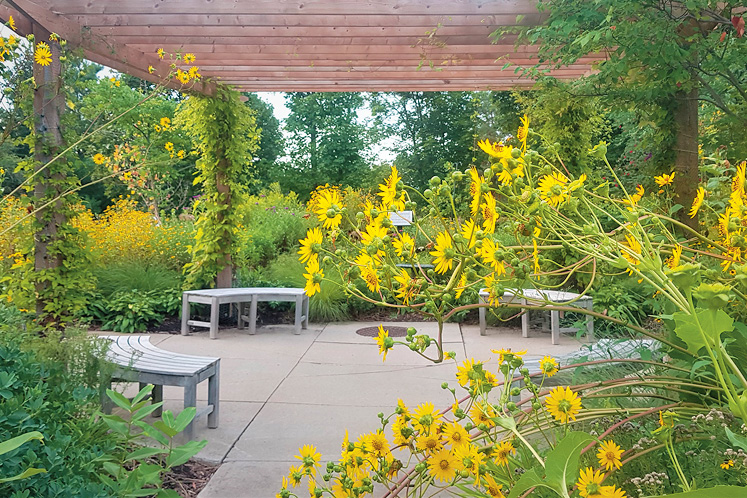
In late summer, the courtyard pergola in the centre of the back border is surrounded by bright yellow blooms, including the reaching tangle of Prairie Dock (Silphium terebinthinaceum).
Everything was humming along swimmingly in 2019 and into 2020. And then came Covid. Many of the older volunteers found themselves on the outside looking in, classed as vulnerable and told, for their own good, to stay away. A whirlwind volunteer recruitment effort was called for and hospice volunteer co-ordinator Kat Powell issued a plea for help.
“Women Who Weed”
Twenty-nine younger volunteers stepped into the breach and a schedule was prepared to ensure social distancing in the gardens. The new volunteers included several members of the Credit Forks Garden Club, under the banner “Women Who Weed,” along with a team of stalwart gardeners from Inglewood led by Marty Harrison. Training provided by Susanne, Sheilagh, and Anita had to happen remotely, and though often inconvenient, it worked. The new, improved naturalistic gardens were in capable hands. So many people doing so much good.
That goodness is embedded in the story of John Doughty who was a resident of Bethell Hospice. John was one of the founders of the Humber Valley Heritage Trail Association and a man who lived to canoe. In fact, he is part of Bethell lore as the only resident to be collected by a family member during his hospice stay for a canoeing outing. His son Angus and daughter-in-law Sian spirited him out one day.
According to his wife Susan, the gardens gave John the opportunity to escape his room. They didn’t substitute for the rock, forest and lakes of his beloved Algonquin, but they offered access to a microcosm of the wild just outside his door. Susan would wheel him about the gardens, and they’d settle on a garden bench and bask in the sun. Susan knew that while John yearned to be over the hills and far away, the gardens cushioned the impossibility of that hope.
After being sent home following his first stint in Bethell Hospice because he refused to die, John was readmitted months later and passed away in August 2019. He was escorted out the front door, draped, as is Bethell tradition, in a quilt from his room. By his side rested a canoe paddle.
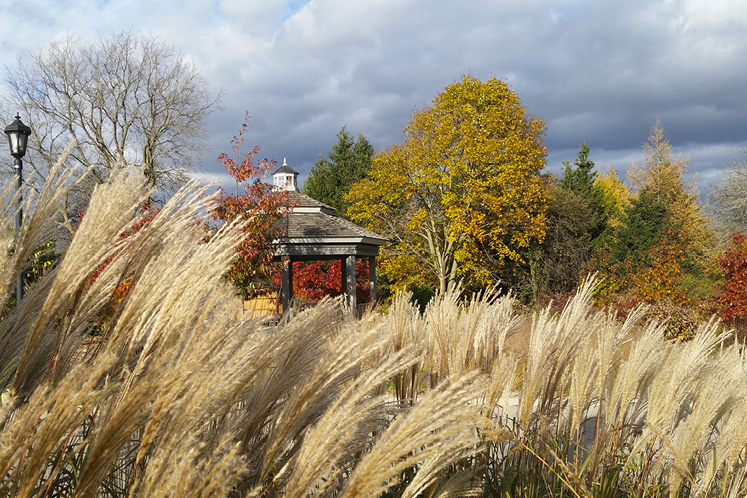
Come fall, the view from the library window reveals waves of golden grasses rippling around the gazebo.
Susan was the gardener in their 58 years of marriage and admits that the trees and flowers of the Bethell gardens were likely a greater comfort to her than to John. That admission affirms the value of the gardens to a broad constituency – not only to the residents but also to family members, volunteers and staff. The benefits to staff were articulated by Peggy Chi, a landscape architect with a PhD from the Institute of Health Policy, Management and Evaluation at the University of Toronto. She came to the hospice in 2019 to speak about the positive effects nearby nature confers on healthcare providers: reduced stress, lower blood pressure, improved alertness and increased job satisfaction.
Peggy Chi’s presentation was the impetus for establishing “The Secret Garden” at Bethell Hospice, a beautiful sitting area embraced by native trees and shrubs where staff can decompress in a sanctuary of their own.
A sign at the hospice, with text written by Susanne, shares the philosophy of the gardens project: “The Gardens at Bethell Hospice are intentionally designed in a naturalistic style … inspired by the patterns of nature.” Susanne then cites the gardens’ ecological benefits which include “wildlife and biodiversity value; requiring low resource inputs such as water, fertilizer and time.”
And then, apropos the hospice setting, she touches on the value of the gardens as a metaphor for the trajectory of life. “This [naturalistic] style embraces the full cycle of life. The gardens are allowed to progress naturally through the passage of the seasons, displaying the particular beauty of each phase… from spring freshness to summer exuberance, to autumn glow, to winter quiet. Promise of renewal and legacy is held in the seeds that persist even in the resting winter garden.”
Taking solace
I love her phrase “displaying the particular beauty of each phase.” There is beauty in the spring, summer, autumn and winters of our own lives. Though beset with challenges, these stages also offer joy and fulfillment, especially if nurtured by friendship, loving families and supportive communities.
In the winter of our lives, we reflect on our successes and failures, and take solace in the continuity of existence, knowing that when we’re gone, our legacy will continue through the relationships we’ve built with the living. Even if we don’t leave behind children and grandchildren, we can take heart that through our actions and deeds we’ve effected positive change in the world.
The creation of the Bethell Hospice gardens is part of that positive change in our corner of the world – testimony to what can be accomplished when a community of caring individuals acts in accordance with their better angels.
Though all of us will die, spring’s eternal promise will once again summon a host of daffodils to flutter and dance in the breeze, “continuous as the stars that shine / And twinkle on the milky way.”
More Info
Don Scallen will present a talk called “Insects in the Garden: Ecological Stars” at the Mono Pollinator Garden Festival at Avalon Lavender Farm in Mono on the afternoon of June 24. Read more of Don’s observations on local flora and fauna in his monthly blog, “Notes from the Wild”.
Related Stories
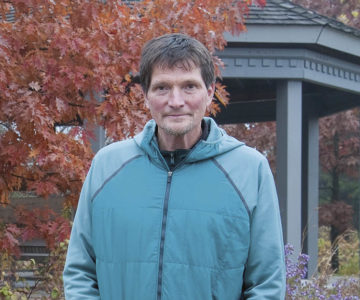
Habit of the Heart: Neil Morris
Nov 20, 2022 | | Local HeroesNeil was awarded Caledon’s Community Champion Award 2022 for both his longtime participation as a member of the Bethell Hospice volunteer team and his involvement in a wide range of Caledon environmental initiatives.

